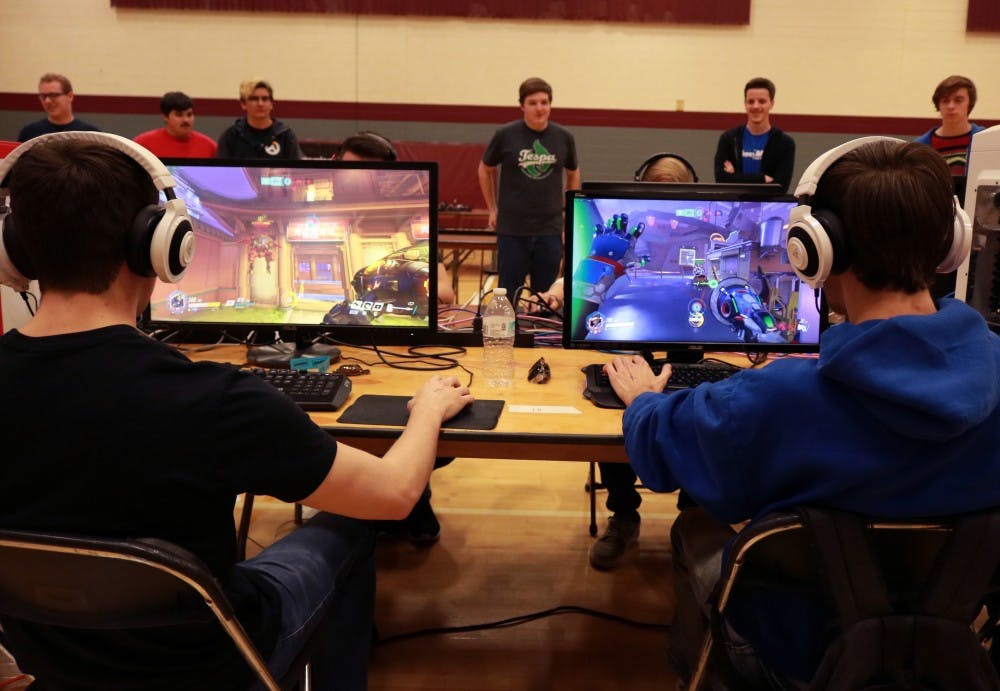COVID-19 has changed the sports world for most athletic departments, but one has primarily stayed the same: esports; and ASU is no different.
The ASU esports club is one of many collegiate esports organizations in the country. In collegiate esports, teams of aspiring professional gamers represent their school in tournaments in a variety of different video games.
ASU esports club President Jacob Matson, a senior studying supply chain management, said the pandemic hasn't had a huge impact on the club's operations, aside from the fact the club isn't using its regular Tempe classroom to meet.
"We can do everything online and have a ton of fun ... in the end, 99.9% of what we play is already online," Matson said. "Overall, event-wise, we're still charging ahead as if nothing happened."
ASU's esports club doesn't have school funding and can't hand out scholarships — the club is run by students and is self-funded. But the club has over 2,000 members members total, with 200 of them making up competitive teams across multiple games.
And in the world of collegiate esports, there is no central organization like the NCAA that regulates competition. Matson said he "would describe it as the wild wild west."
"There are six to 10 to 20 tournament organizers at any given time," Matson said. "There is no official league set up, there is no NCAA."
Club Vice President Claire Kenison, a business data analytics and economics double major in her fourth year, said there is a common misconception about esports that it's a singular competition like basketball or hockey.
"Esports is kinda a broad term," Kenison said. "In terms of a branching tree, esports encompasses a lot of different games, like how sports encompasses the NHL, MLB, NBA and others."
Similar to NCAA athletes, esports athletes wear jerseys, practice rigorously and travel across the country to events.
Still, Kenison said there is a stigma, so she conducted a report surveying what people in Tempe thought the routine of an esports athlete was. Most responses assumed esports athletes were not in good physical shape and ate mostly junk food.
"Our athletes request healthy food and they are very dedicated to keeping their physical bodies in perfect conditions," Kenison said. "I did a report on how esports athletes have four times the hand eye coordination of regular athletes. Reaction times are so imperative to their sport, they have to train themselves to react at a split second's notice."
A growing operation
ASU esports is not a singular team or group but a collective of aspiring professional gamers across multiple titles.
"Esports is more so about the community," Matson said. "You don't have to play video games to be part of ASU esports, you can just come in and hang out."
The ASU esports community was not as unified as it is today. Originally there were separate clubs for each game — but that didn't last.
"From what I know, in the dawning of ASU esports, there were different clubs for different games," said former Vice President Danielle George, a senior studying digital culture. "People thought it was dumb and they made the ASU esports club."
Matson said the club fields teams in League of Legends, Overwatch, Call of Duty, Rainbow Six Siege, and Dota 2.
The club does not just field one team for, say, League of Legends. Typically, there will be multiple teams based on skill requirements — usually determine by one's rank in-game — the highest being the one that goes to tournaments.
The club offers members the opportunity to play and compete in a multitude of games, but Kenison said there are currently three clear favorites: League of Legends, Overwatch and Valorant.
No game can represent the growing popularity of esports better than League of Legends, which developer Riot Games claims had eight million active players at the same time at one point in 2019. They also had nearly 100 million concurrent viewers for its 2019 world championships.
The ASU esports club's League of Legends team is no slouch — they were ranked sixth nationally in the most recent ESPN College League of Legends coaches' poll.
For the other 1,800 or so members who are not on a specific competitive team, the esports club offers local area network, or LAN, parties where members play games such as Among Us or Super Smash Bros. Ultimate. For major tournaments, the club will host watch parties.
Overcoming financial struggles
Without school funding, the money for jerseys, travel and equipment is all out of pocket. George said the club typically operated at a loss when she was vice president.
"Jake (Matson) and I paid for the club out of our own pockets," George said. "If a student can't afford a jersey but they need it for something, we'll probably buy it for them."
Without a central organization like the NCAA, school funding is very important to keep an esports club afloat.
Matson, Kenison and George all said school funding helps how efficiently an esports club operates and performs. Esports scholarships can also be a big draw for recruiting new members — the National Association of Collegiate Esports has given $16 million in scholarships. But ASU is not one of its member schools, and there is no scholarship for esports athletes.
"Funding is similar to how the NCAA helps students with school and gives them extra resources," Kenison said. "Having coaches to analyze your habits, helping students maintain athlete-student balance, maintaining your physical support, that all makes a big difference in esports. Talented people will go to those schools for the resources."
Reach the reporter at cvanligt@asu.edu and follow @Connor_VL on Twitter.
Like The State Press on Facebook and follow @statepress on Twitter.




